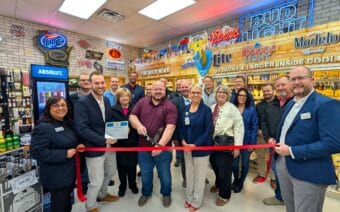January 9, 2024
PLYMOUTH – As Mark Twain once said, “History doesn’t repeat itself, but it often rhymes.”
While the details aren’t identical, for the second time in 80 years, an entrepreneurial veteran in Plymouth is launching an original soda brand called Hi-Ho.
A historical repeat
The first time around, in 1945, Hi-Ho Bottling Company was the brainchild of World War II veteran Donald Holzschuh.
Holzschuh’s veteran status granted him special access to sugar when American citizens were otherwise limited by wartime rations.
The entrepreneur partnered with another Plymouth resident, Joseph Hildebrand, combining ambitions (and the first two letters of both their last names) to create Hi-Ho soda.
Though the company was sold about 10 years later, production remained based in Plymouth. Hi-Ho Bottling Company would eventually shutter by the mid-1970s, but the community remembers – proudly preserving the brand with a massive mural in downtown Plymouth.
Fast-forward 50 years, and another veteran, Tyler Rezachek, is set to restart Hi-Ho – partly due to a different sugary situation.
“It started with Christmas cookies,” Rezachek said. “I was driving down Mill Street and I saw a sign in front of the (Plymouth) Historical Society that said they were selling Christmas cookies – I whipped a (U-turn) and I drove back because I wanted some.”
Rezachek said little did he know, but his sweet tooth was about to bite off more than he could’ve known.
“After I got my cookies, I was walking around at the museum,” he said. “They were doing silent auctions, and they had a Hi-Ho soda crate with a 10-line blurb about the company – (saying it) was started by a World War II veteran, because he had access to sugar and other people didn’t. And I was like, ‘wow, I feel a connection to that.’ I walked out of the building and I was like, ‘I’ve got to start this.’”
Not long after, Rezachek said he decided to create a Facebook account under the Hi-Ho Bottling Company name – the first step of a whirlwind journey.
“I made one post, and in a few days, we had hundreds of followers,” he said. “I was like, ‘okay – there’s something here.’ But I still needed to learn how to manufacture soda.”
Rezacheck said he hoped to find the enthusiasm for Hi-Ho likewise extended into the business community, from which he openly requested collaborators to step forth.
“I said soldiers don’t fight alone, so I don’t like to do that in business either, and that if anyone wanted to partner, to reach out,” he said.
Rezachek said his call for reinforcements was answered the next day, by Leo Borstov and Ryan Schroeder.
“Leo’s a professional chef,” he said. “He’s been cooking his own syrups for sodas for like 10 years, and he wanted to lead recipe development. And then Ryan is the owner of R & R Moving here in Plymouth. He has a couple of decades of beverage packaging experience and loves soda, so it all came together.”
Rezacheck said within a week, the three would meet up for the first time, seated at an old kitchen table with a notebook to jot down their strategy.
“Once Leo and Ryan and I all got into a room together, you could tell this was going to get done,” he said.
A new plan for the old business
Rezachek said claiming the Hi-Ho Bottling Company name has perhaps been the least complicated part of the process.
“(The name’s) up for grabs at this point and in the public domain, because it hasn’t been used for so long,” he said. “You’ve got to execute on a trademark to keep it, and no one has used the Hi-Ho name since the mid-’70s. So, we started using it, and now the trademark is ours.”
For several practical reasons, Rezacheck said beyond its name, his iteration of the company will have to be more of a reinvention than a revival.
He said the original soda’s recipes are unfortunately lost, at least as of now – though, he said, he’d be thrilled for them to be discovered.
“That would be the ultimate goal, right?” he said. “If I could find something on a piece of paper from back then, but I think the reality of that is probably pretty slim. I’m going to assume most of that was intellectual property, and when it closed down, it went away.”
Rezachek said as a member of the local Lions Club, he has heard from some residents who recall drinking original Hi-Ho sodas – but the vast majority of his support, he said, is from people simply excited about soda being manufactured in Plymouth again.
“There have been a couple of the original founders’ family members who have reached out and given us some comments of support on Facebook,” he said. “They’re excited about what we’re doing to carry out the legacy.”
Among the other details lost to history, Rezachek said, is confirmation of the original variety of flavors of Hi-Ho.
“That’s one of the big challenges,” he said. “I only know for sure they made orange soda. Other than that, I don’t know because Hi-Ho bottles all had the same label. So unless there’s liquid in them, you don’t know which soda it was.”
Beyond orange, Rezachek said he has utilized social media to crowd-source suggestions for soda flavors.
“We don’t want to make sodas people aren’t going to drink, so everything we do is going to be tested with the public – getting their opinion, iterating based on that opinion and then figuring out the sweet spot,” he said.
Rezachek said once the flavors are decided and developed, he intends to organize small taste testings, as early as this spring, to solicit feedback.
Among the likeliest flavors Hi-Ho will pursue, Rezachek said, is root beer – an early front-runner with the public.
He said his version would have a more prominent sassafras and licorice taste.
Rezachek said he also plans to utilize Door County cranberries for various blends and aims to accommodate Wisconsin palates with an old-fashioned (sans alcohol) flavor, as well as a “punch-you-in-the-mouth sour” 50-50 soda.
All of Hi-Ho’s flavors and extracts will be sourced locally, he said.
“The goal is to keep the money in Wisconsin, so that’s what we’re going to try to do,” he said.
Rezachek said though he loves caffeine, there are no plans for Hi-Ho sodas to contain it – a decision he made after learning caffeine would categorize his products as regulated substances per the US Food and Drug Administration.
“I looked that up and I was like, ‘okay, I’m avoiding that,’” he said. “It opens us up to a massive amount of government bureaucracy and red tape.”
Rezachek said the sodas will all contain sugar, as opposed to any diet or low-calorie options.
“We’re all of the belief that soda is meant to be soda,” Rezachek said. “It’s supposed to be a sugary drink.”
That sweetness, Rezachek said, will be sourced as locally as possible as well, primarily from Wisconsin honey and sorghum syrup.
If a given soda’s profile requires, he said, Hi-Ho will source beet sugar from Michigan or Minnesota.
In addition to his desire to support local businesses, Rezachek said he aspires to limit shipping prices as part of minimizing Hi-Ho’s production costs.
Along these lines, Rezachek said he had to make another practical but tough decision – Hi-Ho Bottling Company will be canning – not bottling – its sodas.
“There was a lot of debate about that,” he said. “We chose cans for a couple of reasons. Bottles are heavier to ship, and when you start multiplying that over a lot of pallets, it starts becoming expensive to ship packaging.”
He said glass bottles are more expensive to produce as well, not to mention much more breakable than cans.
Rezachek said there’s also much more accessible infrastructure built around small-run canning compared to bottling – which he said is likely why most craft beer companies choose cans over bottles.
He said he hopes the first canning run of Hi-Ho sodas will happen in April and intends to offer pre-orders to excited customers.
The cans, Rezachek said, will take inspiration from high-resolution pictures of original Hi-Ho branding.
He said he’s considering emulating the New Glarus Brewing Company model and selling Hi-Ho products exclusively within Wisconsin.
With that in mind, Rezachek said he’s been speaking with local businesses about selling the soda, since he said Hi-Ho will not have its own retail location.
One of the ideas, he said, is to offer delivery services of cold Hi-Ho sodas to select establishments, designated as pick-up locations.
“We’re having conversations with (distributors statewide), and they’re all excited about it,” Rezachek said. “Everyone is willing to give information, and to help us out with this, so they can see (Hi-Ho) happen again.”
From military service to serving up history
Rezachek said as a veteran, he’s all the more grateful for the support he’s received from the community for this venture.
He said he is one of many veterans who has endured a succession of frustrations upon returning to the job market following his service.
“I spent 2013 through 2020 probably having 30 different jobs in those seven years,” he said.
Among his issues, he said, were the lack of structure, efficiency and a lack of fellowship in his various workplaces.
“The opposite of how the military works, and I think a lot of vets struggle with that,” he said.
Rezachek said his solution was common for veterans: entrepreneurship.
In the winter of 2021, he said he was among 50 veterans to participate in an annual “entrepreneurship boot camp” at Texas A&M.
“That was a pivotal and life-changing week,” he said. “I went down there thinking I knew how to run a business and realized I didn’t know anything. That’s what I credit for my entrepreneurship experience and dreams now.”
Rezachek said his medium-term goal is to raise Hi-Ho’s profile throughout Wisconsin.
Though, he said, he especially hopes to help grow Plymouth, the city he’s lived in since he was four.
“(Plymouth) has incredible potential,” he said. “This whole area of Wisconsin and Wisconsin in general do. If I’m going to be an entrepreneur and put my time into something, I’m going to do it here.”
To keep up to date on Hi-Ho Bottling Company’s progress, check out the company’s Facebook page.
 Lakeside Foods acquires Oregon-based Smith Frozen Foods
Lakeside Foods acquires Oregon-based Smith Frozen Foods Vines & Rushes Winery: Wisconsin-grown wine with every sip
Vines & Rushes Winery: Wisconsin-grown wine with every sip








